Welcome to Biotech Spotlight, a series featuring companies creating breakthrough technologies and products. Today, we’re looking at Scribe Therapeutics, which is using CRISPR-based technology to target risk factors for the most common cause of death: cardiovascular disease.

In focus with: Benjamin Oakes, CEO, president, co-founder, Scribe Therapeutics
Scribe’s vision: Scribe uses CRISPR-based platforms to develop one-and-done genetic medicines that could one day head off cardiometabolic diseases and eliminate the need for years of costly and burdensome medical interventions.
The preclinical company, co-founded by CRISPR pioneer Jennifer Doudna, employs its X-Editor platform, to mitigate off-target genetic changes plaguing the first CRISPR therapies recently coming to market, potentially resulting in safer and more powerful gene editing. Scribe’s addition of an epigenetic editor called ELXR to turn off gene expression of multiple genetic targets could also add a degree of reversibility.
The two platforms work either alone or complementary to one another and give Scribe a toolbox to tackle different problems.
“We see a lot of folks out there that just license a single technology from academia, and they're stuck using that technology — they become the classic hammer, looking for a nail,” Oakes said. “We don't have that challenge. What we actually get to do, and what we have done for many of our targets, is ask, ‘which is the best tool for the job,’ or ‘what's the best tool for the patient population?’”
For Oakes, a 2024 PharmaVoice 100 honoree, the company’s mission resonates with his own health journey.
“I have severe cardiovascular risk due to my family history,” he said. “While I certainly will take a pill or an injection every day or every week for the rest of my life to mitigate that, I think it would be great if I didn't have to, or if my son didn't have to. I think that's the world that we should all really hope to live in.”
Why it matters: Cardiovascular diseases are the leading cause of death worldwide, killing 17.9 million people in 2019 and making up 32% of overall deaths, according to the World Health Organization. One risk factor is high cholesterol, which causes a potentially deadly build-up in the arteries.
“Our goal is to make it safe enough that everyone can take it before they have a disease — and never get a disease."

Benjamin Oakes
CEO, president, co-founder, Scribe Therapeutics
Scribe’s preclinical genetic treatment candidates are designed to reduce elevated levels of three types of potentially harmful blood lipids that place patients at risk for cardiovascular disease. The company is focused on moving its lead pipeline prospect STX1150 into the clinic to reduce levels of low-density lipoprotein cholesterol, which is one of those lipids.
If successful, the treatment might eliminate the need for widely used medications such as statins, which are effective, but have side effects and drawbacks, including low adherence rates among high-risk patients, Oakes said.
“Our goal is to make it safe enough that everyone can take it before they have a disease — and never get a disease,” he said.
The road ahead: As the company progresses its pipeline, it’s also partnering with big pharma companies, such as Sanofi in oncology, sickle cell and other genomic diseases, as well as Eli Lilly in neurological and neuromuscular diseases. However, to better position itself for clinical trials, the biotech also cut 20% of its workforce at the start of the year.
In-house, Scribe is focused exclusively on the cardiometabolic space, where it may eventually broaden its focus to hypertension, insulin resistance and obesity, he said. Other companies are also developing gene therapies for cardiovascular disease, including Verve Therapeutics with a base-editing approach and Intellia Therapeutics, which has a collaboration with Regeneron to develop a CRISPR-based treatment for transthyretin amyloidosis.
Oakes said the market is big enough for all of them, but Scribe differentiates itself with its platforms.
“We have built two entirely distinct platforms that I truly believe are leading genetic medicine platforms,” he said.” I haven't seen anyone demonstrate the level of potency or specificity or selectivity with their genome editors or the epigenetic technologies that we have.”





























































